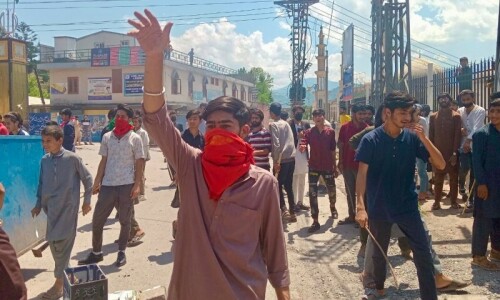 |
| Scavenger girls rummage through garbage in Peshawar. The young ones collect recyclable material which their families sell and earn a living.—White Star |
SAVE for some of the big local corporates and multinational firms, the entrepreneurs of most companies drew a blank when asked about their contribution to the MDGs; for many, it had to be spelled out.
Some senior executives of big companies who had attended seminars held by the Corporate Social Responsibility Centre Pakistan (CSRCP) had an idea of its goals in consultancy; trainings; reporting Database and Global Reporting Initiatives (GRI). “Yet, I am not aware of any work on the eight international development goals that were established following the Millennium Summit of the United Nations in 2000,” said one.
A senior executive at a multinational firm said: “Big companies that have worldwide exposure and who are required to submit reports to their overseas head offices do allocate funds for those goals: alleviation of extreme poverty; promotion of primary education; child mortality and maternal health”. He said the figures could be traced in the annual accounts of those companies.
Industrialist Majyd Aziz, however, argued that most entities allocate and spend funds for those social responsibility goals in their individual capacity and as permits their budget. He stressed that the state should shoulder the greatest responsibility of welfare of the people. “But look at the budget allocations on poverty alleviation, health and education – nothing but a pittance,” he argued.
Another head of a corporate firm agreed that it was primarily the responsibility of the government to initiate and organise work on those goals. He thought that corporates had too much on their mind to worry about what was going on outside their factory windows. “With perennial problems of energy and water shortage, political upheavals, increasing taxes, changing and tightening regulations, all of which put their bottom lines at risk, most companies decide to sit tight on their pile of cash held in reserves”, he said but insisted that most big companies do adequately look after their workers and families by providing reasonable wages and salaries, free education to their wards and free healthcare benefits.
Another head of a local pharmaceutical firm said that his company was working with a non-governmental organisation (NGO) to provide free medical care in around two dozen dispensaries set up in rural Sindh.
He agreed that the work on MDGs should be taken in stride by both the government and the affluent private sector as the world had now progressed from MDGs to Sustainable Development Goals (SDGs) 2016-30.
Published in Dawn, September 13th, 2015
On a mobile phone? Get the Dawn Mobile App: Apple Store | Google Play













































Dear visitor, the comments section is undergoing an overhaul and will return soon.